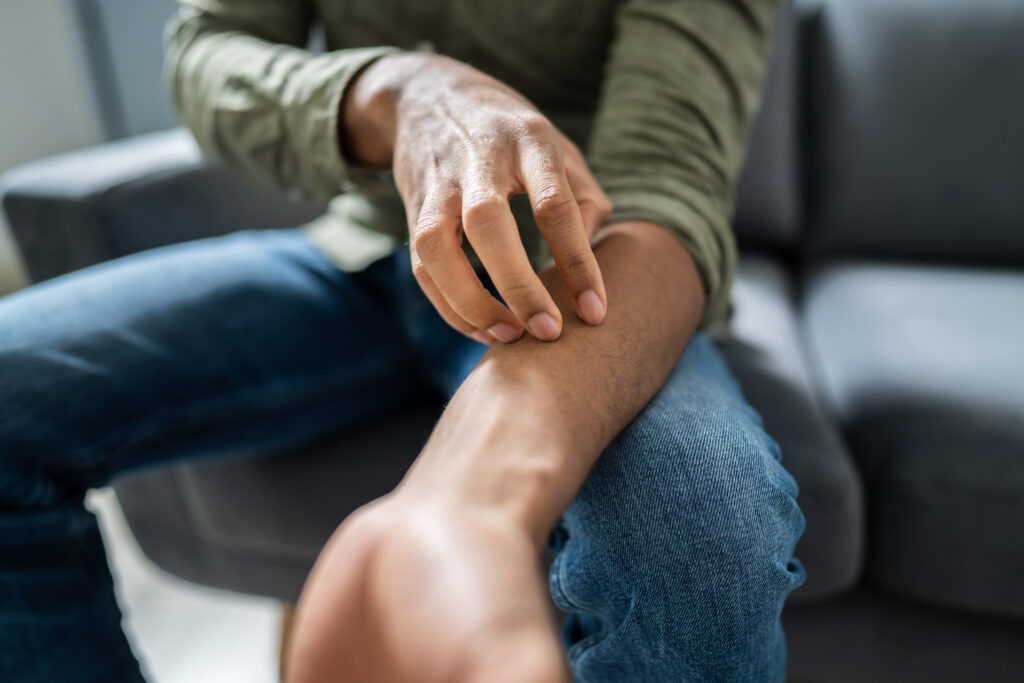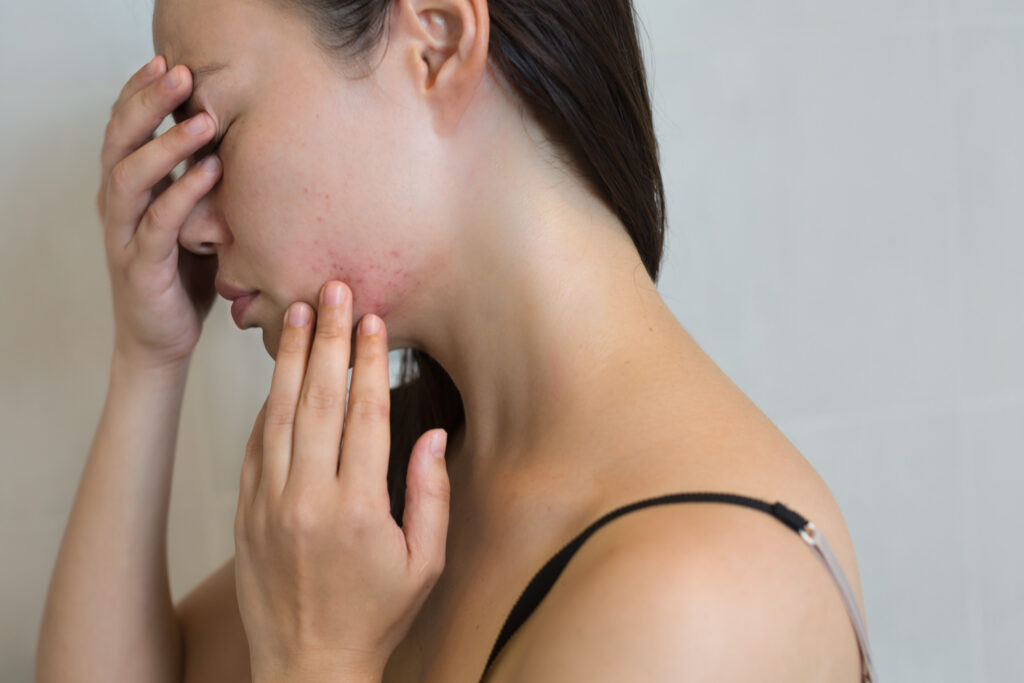Eczema
Eczema, also known as dermatitis, is a common skin condition in both children and adults. Atopic eczema is the most common type of eczema, affecting one in 5 children and 1 in 10 adults. Eczema is a non-contagious condition, but it can have a significant impact on the lives of those affected.
This guide will go through how to recognise and manage eczema symptoms if you think you or your child might have the condition.
What is eczema?
A skin condition, eczema causes patches of skin to become inflamed, itchy, cracked, or rough. In some cases, skin affected by eczema can blister.The most common type is atopic dermatitis, although there are several different types of eczema.
Eczema is more prevalent in children, but it is also common in adults. Many children outgrow this condition, although some will continue to be affected throughout adulthood.Symptoms can vary from person to person, with some people experiencing mild eczema and others suffering from severe eczema.
Eczema can develop all over the body but most commonly occurs on the hands, insides of the elbows, on the backs of the knees, and on the face and scalp.

What are the most common eczema symptoms?
Symptoms vary depending on age. The symptoms of eczema in children are often different from eczema in adults.
General eczema symptoms:
- Dry, scaly skin
- Itching
- Open, crusted sores
- Skin flushing
Baby eczema symptoms:
- Rash on the scalp and cheeks
- Leaking rashes
- Extreme itching
Childhood eczema symptoms:
- Rash behind the knees and in elbow creases
- Rash on the neck, wrist, ankles, and the buttock crease
- Bumpy rash
- Rash that becomes lighter or darker
- Skin thickening
Adult eczema symptoms:
- Scaly rash
- Rash in creases of knees, elbows, and nape of the neck
- Rash all over the body
- Very dry skin
- Itchy rash
- Skin infections
What areas of the body are affected by eczema?
Eczema can affect many different types of the body. In fact, it can occur anywhere on the skin. In adults, the most common areas affected by eczema are:
- Eczema on face
- Eczema on eyelids
- Eczema around the eyes
- Eczema on the neck
- Eczema on foot
- Eczema on fingers
- Eczema on elbows
- Eczema on knees
However, some people also experience eczema on lips, eczema on legs, eczema around mouth, and eczema scalp.
What are the different types of eczema?
Lorem ipsum dolor sit amet, consectetur adipiscing elit, sed do eiusmod tempor incididunt ut labore et dolore magna aliqua.
Atopic dermatitis
The most common type of eczema, atopic dermatitis, manifests as patches of dry, itchy skin that may crack, bleed or become infected.
Allergic contact dermatitis
This type of eczema occurs after contact with a substance or allergen that the immune system does not recognise.
Dyshidrotic eczema
Dyshidrotic eczema refers to skin irritation on the palms of the hands and soles of the feet, which causes blistering.
Neurodermatitis
This causes scaly patches on the skin on the head, forearms, wrists, and the lower legs. It is typically caused by an irritation such as an insect bite.
Discoid eczema
Discoid eczema, also known as nummular eczema, manifests itself as circular patches of irritated skin that often become crusty, scaly, and itchy.
Stasis dermatitis
This affects the lower legs and is typically caused by poor circulation.

What are the main eczema causes?
While there is no definitive cause of eczema, it is thought that this condition develops from a combination of generic and environmental factors. For example, if a parent has eczema, their children are more likely to develop this condition, and if both have it, there is a greater risk.
Environmental factors
External irritants
External irritants such as soaps, washing powders, shampoos, and cleaning agents can all trigger eczema symptoms.
Allergens
Dust mites, pets, pollen, and mould can all trigger eczema. This is a type of eczema known as allergic eczema.
Microbes
Bacteria such as Staphylococcus aureus, viruses and certain fungi can all cause eczema to flare up.
Extreme temperatures
Very hot and very cold temperatures can all make the symptoms of eczema worse. High and overly low humidity levels can also cause flare-ups.
Certain foods
Foods such as dairy products, eggs, nuts, seeds, soy products, and wheat can all exacerbate eczema symptoms.
Stress
Although stress is not a direct cause of eczema, it can make your symptoms worse. It can also make it more difficult to deal with the emotional impact of this condition.
Hormones
Women may experience eczema flare-ups due to changing hormone levels. This can occur during pregnancy and during the menopause.
What are the most effective eczema treatments?
There is currently no cure for eczema, but there are treatments that can help to heal the skin and prevent future outbreaks such as Locobase Eczema Cream. You can see your GP about the right treatment plan to treat your symptoms, as this will be dependent on your age, the severity of symptoms, and your overall health.
In some people, eczema will go away over time, and in others, you will need to manage this condition for the rest of your life.
Some of the most effective treatments for eczema include:
Over the counter treatments
If you would prefer not to go to your GP about your eczema, then there are many over-the-counter treatments that you can try.
Locobase Eczema Cream is a highly effective emollient that can be applied to all areas of the body and face. Designed to support the skin’s own repair mechanism and is cortisone free. Locobase Eczema Cream soothes the symptoms of eczema, such as very dry and itchy skin.
Having a skin care routine with products against dry skin, such as Locobase Everyday Special Lotion and Locobase Everyday Special Shower Oil will all together soothe symptoms of Eczema.
Corticosteroid creams
Corticosteroid creams and ointments are applied topically to any affected areas and work to reduce inflammation and itchiness. You can get corticosteroid creams of varying strengths depending on how severe your symptoms are.
Oral medications
If topical treatments are not effective for you, your GP may prescribe an oral medication such as a systemic corticosteroid or an immunosuppressant.
These can be taken orally or given as an injection.
Antibiotics
If you have a bacterial infection alongside your eczema, your GP will prescribe a course of antibiotics to treat this.
Antihistamines
If you struggle with eczema itching and your scratching is making your condition worse, then antihistamines can help you. It is worth noting that these can cause drowsiness, so they are best taken at night.
Calcineurin inhibitors
These are applied topically and are designed to suppress the activities of your immune system. This results in reduced inflammation of the skin and the prevention of future flare-ups.
Special moisturisers
There are many moisturisers on the market that are designed to treat eczema. These are typically marketed as barrier repair moisturisers. You can find eczema moisturisers in ointment, cream and lotion form depending on how dry your skin is and how severe your symptoms are.
Phototherapy
Phototherapy has been proven to be very effective in the treatment of eczema and involves exposing the skin to UVA or UVB waves. This method is typically used for people with moderate eczema.
Biologic drugs
Biologic drugs are used to block the proteins in the immune system that cause eczema. These drugs are usually injected into the body.
How to live with eczema
Living with eczema can be hard, especially if your symptoms are severe or you experience frequent flare-ups. As well as ensuring that you take any medication recommended by your GP, it can also be highly beneficial to seek the support of others affected by this condition.
National Eczema Society offers support and advice to people affected by eczema.
Eczema FAQs
What is the main cause of eczema?
Eczema has many causes, including genetics, environmental factors, and an overreaction of the immune system. Eczema is more common in children, but it does also affect adults.
What gets rid of eczema fast?
Depending on how severe your symptoms are, an over-the-counter eczema moisturiser or ointment can be highly effective. If this does not work, your GP may prescribe a corticosteroid cream. For eczema on the feet, Footner is a good choice.
What does eczema look like?
Eczema typically manifests itself as dry, scaly skin. This is usually red in colour on light-skinned people and a dark brown, purple, or ash grey on those with dark skin.
Skin can also feel warm to the touch, and you may also experience small bumps on the skin.
Will eczema go away?
Eczema does not usually go away on its own, although children may grow out of this condition. There is no eczema cure, but it can be managed with the right treatments. If left untreated, your eczema is likely to get worse and may even cause deformities or disablement.
Can eczema be caused by stress?
Stress does not cause eczema, but stress can trigger its symptoms. If you have eczema and stress, it can be a good idea to adopt practices to manage your stress levels, such as meditation, breathing techniques, and yoga.
Does eczema spread if you touch it?
Eczema is not contagious. It cannot spread from one person to another via contact. However, it can spread from one part of your body to another. Scratching can also make your eczema more likely to spread and can make your symptoms worse.
What foods to avoid if you have eczema?
If you have eczema, you should avoid foods that are known for triggering this condition, such as dairy products, gluten, eggs, tomatoes, and citrus fruits.
What does an eczema flare look like?
An eczema flare-up looks like red patches of scaly skin. These patches are often warm to the touch and can be itchy.
What can be mistaken for eczema?
Several other skin conditions can be mistaken for eczema, including psoriasis, seborrheic dermatitis, and scabies. If you are not sure which type of skin condition you have, it’s best to make an appointment with your GP for an official diagnosis.
No products found